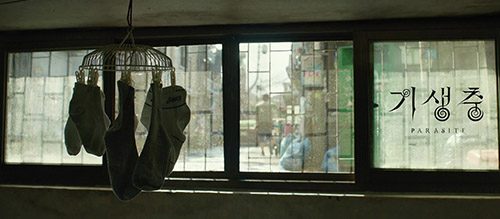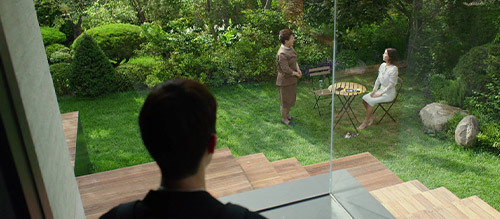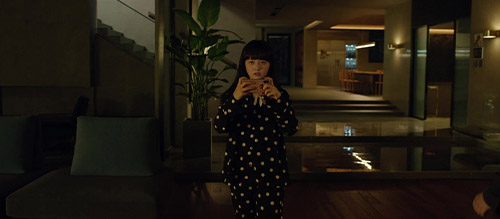Windows Into Bong Joon-ho’s ‘Parasite’
Today I’m here to talk to you about windows. No, wait! Come back! It’s interesting, I promise!
I’m here to talk specifically about Bong Joon-ho’s stylistic and thematic use of windows in his 2020 Best Picture Oscar winner Parasite. There are innumerable ways of approaching Director Bong’s rich and layered class upheaval satire, and one is by passing through a layer of glass.
Parasite opens on a window, the title etched on a pane to the right like a sad child’s doodle. This grimy portal is how the poor Kim family view the street outside from their semi-basement dwelling. The camera has to lower quite some distance from the street to meet the face of the first family member, Kim Ki-woo (Choi Woo-sik) who is glued to his phone.
Through this same window the Kims watch the world outside passing by. The world above doesn’t give them a second thought, but they watch and patiently wait for an opportunity to present itself, anything that will improve their lot in life.
Through their window the Kims see fumigators gassing the streets of their impoverished neighbourhood and opt to leave their window open for “free fumigation”. Few things in life are free, but when they pass straight outside your house you’d better make the most of them. Nightly they watch a local drunk relieving himself right outside their dwelling, literally pissing on their world – the Kims are on the lowest rung of society’s ladder and they get a constant reminder of this through the glass that looks into their communal space as they eat.
Later in the film, the same window being left open allows the Kims’ semi-basement to flood, washing in the filth and debris of their community and reminding them of their allotted place in society. We return to this window one final time in the last shot of the film, representing a return to the status quo after a brief and violent upset to the class system when we see Ki-woo once more sitting below his window, right back where he started.
In stark contrast to the Kims’ subterranean jumble, the wealthy Park family live in a modern-styled dream house that looks more like a trendy art gallery – all pristine glass and seamless wood. The first time we, and Ki-woo, see this enviable habitat, the immediate thing that leaps out is that one side of the house is dominated by floor-to-ceiling windows, like a department store. You can see the luxurious side of life, but you can’t get at it through this clear barrier.
While Ki-woo waits to meet his potential employer we watch, through a large window again, the Parks’ housekeeper Moon-gwang (Lee Jeong-eun) attempting to rouse her zonked out mistress (Jo Yeo-jeong) in the garden – the angle of the corner glass tellingly bifurcates the screen into social classes with “the help” on one side of the line and “the madam” on the other, hammering the film’s main theme home once more.
When the heads of the two households meet for the first time, it is again through glass at Mr Park’s (Lee Sun-kyun) pristine executive office. Mr Park looks up from his meeting to see Mr Kim (Song Kang-ho) awkwardly attempting to introduce himself through the glass wall that separates them before Park resumes what he was doing – the barrier doesn’t offer privacy but it does offer him an opportunity to ignore disruptions to his life and work should he wish to.
The Parks’ living room is also almost completely surrounded by glass. When the Kims, all posing as hired help to the Parks, are left to their own devices in the house when the rich family goes on an impromptu camping trip, we glimpse them through rain and behind glass – a poor family playing make-believe as a wealthy family. Just before we learn the Parks have cut their trip short and will in all likelihood soon discover the Kims’ deception, drinks glasses on the table are shattered, as is their illusion, their fantasy life. As Ki-woo would say, “Very metaphorical”.
There’s another relevant window to discuss in Parasite – phone screens. They allow for secret communication and recording of incriminating evidence which powers crucial plot turns in the film. This is perhaps the most important aspect of all: phones act as windows into the lives of others. Characters in Parasite variously see the sending and receiving of information by mobile phone as a temptation (teenager Park Da-hye’s secret tryst with her tutor Ki-woo), an addiction (the Kims toasting the return of “bounteous WiFi”), a weapon to be used against your enemies (will Moon-gwang send out what she’s got on the Kims?).
Do reflections reveal or do they distort? Light passes through clear glass as does our vision, but it is never entirely without distortion. Glass is a permeable barrier, but a barrier nonetheless. Bong Joon-ho’s use of clear but solid divides between his characters comes back around to Parasite’s main thesis – you might not think about class divides, you might not see them in your daily life, especially if your lifestyle is privileged, but those divides are there and they’re exceedingly difficult to crack, let alone shatter.




